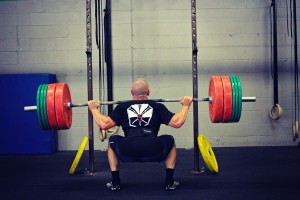02
Jun 2014
Deconstructing the Squat
 Let’s deconstruct squatting shall we. Why? Well, for one we do it quite often here at CF Magnitude, and you know what else, come to think of it, we do it every single day outside the gym!
Let’s deconstruct squatting shall we. Why? Well, for one we do it quite often here at CF Magnitude, and you know what else, come to think of it, we do it every single day outside the gym!
Every time you get up out of a chair, or sit down on the “thrown”, you are squatting
Every time you drop your keys, you must squat down to get them
The scenarios are endless! …But the movement is the same! And should be practiced, and conditioned. Often, more is not always better but it usually is. This is the case with squatting.
Is Squatting Safe?
there is some serious hatorade being splashed on squatting
This is a great place to start. We advise you to do a little research experiment- type in “is squatting dangerous” into the Google search bar, and see what comes up. You will find yourself bombarded with a endless list of blogs, personal trainer sites, and the such, whom all flaunt they know best and many of which demonize the movement. (Little do they know they are doing it every single day…regardless if they have a barbell on their back). The data actually shows quite the opposite though. Squats have long been criticized for being destructive to your knees, but research shows us that when done properly, squats actually improve knee stability and strengthen connective tissue.
I mean without going into the science of it, it just kind of makes sense. These guys seem to be doing OK. one might even argue that squatting has helped their knees stay in shape.
Squatting Makes You Slow?
Here is another myth that is often pumped out into the mediasphere. “if you squat, you will get bulky and slow, and be less good at sports” Well, to just start of with a reactional answer- “that is complete B*ll S*$t and needs to be saved for your bro science diary”
But…. we don’t answer statements like that here. That would be mean and judgmental! Perhaps instead you might answer in such way. “actually kind sir, (or miss) squatting is a vital functional movement in any movement practice, regardless of your goal end result. Also observable, measurable, and repeatable science shows us that in fact squatting is one of the most powerful ways to increase sports performance (in particularly with sprint performance and vertical jump) Whether you’re a weekend warrior or a mom who chases after a toddler, you’ll be interested to know that studies have linked squatting strength with athletic ability, improved mobility, and physical prowess. “
This dude has some interesting things to say about squatting. In between the swears, he actually has some very powerful information to share!
SOO! we recognize pictures and videos of jacked guys can be overpowering and instill a message without even knowing the information. That’s often times not good. SOO! we share some nerdy scientific journals HURRAY SCIENCE!
2. PubMed: The effect of the squat exercise on knee stability.
Some Ending Tid Bits
— Squats are mostly known as a leg exercise, but they promote body-wide muscle building by catalyzing an anabolic environment. Anabolic is the state in which your body is fueling and building. (vs. catabolic which is the resting state of your body…where it heals, and detoxes)
— Squats are also one of the best functional exercises out there, promoting mobility and balance and helping you complete real-world activities with ease
— Squats also help you to burn more fat, as one of the most time-efficient ways to burn more calories continually is by developing more muscle
— Squats have long been criticized for being destructive to your knees, but research shows that when done properly, squats actually improve knee stability and strengthen connective tissue
— Squats are one type of exercise that should be a part of virtually everyone’s fitness routine, as they provide whole-body benefits
AND AN ARTICLE TO CHECK OUT
8 Common Squatting Mistakes and How to Correct Them For Stronger Squats

 Facebook
Facebook Instagram
Instagram

